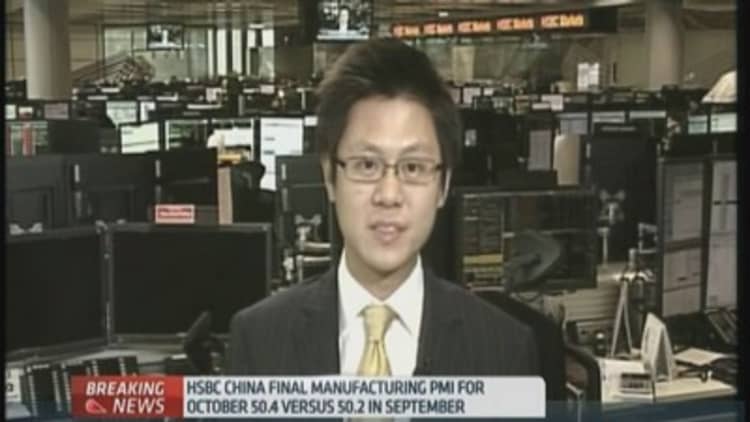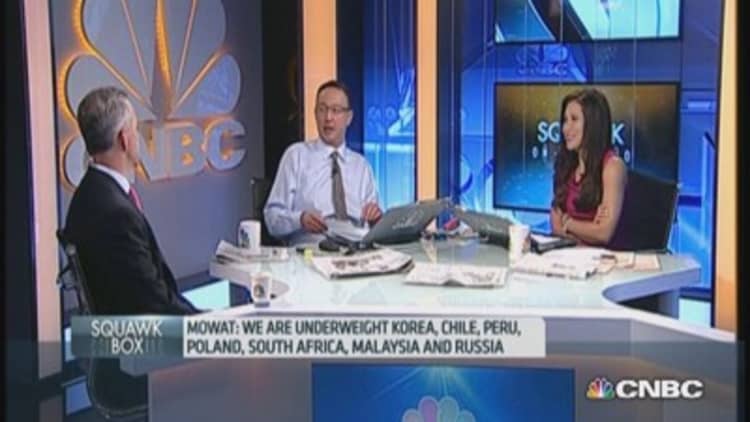Asian equities were mixed on the first trading day of November as investors digested a raft of Chinese data. Overall, the mood was quiet with Japan closed for a holiday.
HSBC's China final purchasing manager's index (PMI) for October rose to a three-month high at 50.4, unchanged from a preliminary reading and higher than September's figure. The report followed data over the weekend that showed China's official PMI for October falling to a five-month low at 50.8.
Other data on Monday showed the country's services sector growing at its slowest pace in nine months in October, with the official services PMI falling to 53.8 from 54 in September.
Read MoreChina's growth in danger of slowing more sharply
Currency movements were in focus after the yen hit a seven-year low against the greenback following the Bank of Japan's surprise bond-buying stimulus on Friday and news of portfolio re-balancing from the Government Pension Investment Fund (GPIF). Meanwhile, the euro dropped to its lowest level in over two years at 1.244 per dollar ahead of the European Central Bank's policy review later this week.
Shanghai up 0.4%
China's Shanghai Composite index rose to a 20-month peak, gaining for a fifth straight session.
Guangzhou Shipyard International soared 10 percent after announcing on Friday that it will buy Huangpu Wenchong Shipbuilding for $741 million.
Dongfeng Motor closed over 1 percent higher despite third-quarter profit declining 16 percent on year.
Hong Kong shares reversed gains, moving off a six-week high hit in early trade. Standard Chartered fell 2 percent on reports that the bank's non-executive directors are plotting to speed up the replacement of Peter Sands as CEO.

ASX dips 0.3%
Australia's benchmark index ended a two-day winning streak, erasing gains after after hitting a new seven-week high of 5,535 points in early trade. The index surged over 4 percent in October, making it one of the region's best-performing indices.
The Australian dollar fell nearly 1 percent to a two-week low of 87 U.S. cents after home-buildings approvals fell 11 percent in September from the month before.
In earnings news, Woolworths slumped nearly 5 percent after its CEO said that the retailer's 3 percent increase in sales during the three months through September was lower-than-expected. Westpac eased 0.6 percent despite reporting a fifth straight year of record profits.
Read MoreChina PMI, Australia to steal the show in Asia
Kospi down 0.6%
South Korean shares retreated from Friday's three-week high after a private gauge of manufacturing activity fell to a four-month low in October. Meanwhile, the won weakened to a seven-month low against the greenback.
Kia Motors and Hyundai Motor tanked 6 percent each after Kia's CEO resigned late Friday. President Lee Sam-woong stepped down to take responsibility for wage strikes by Kia's union; he will be succeeded by vice president and CFO Park Han-woo.
Read MoreCheaper EMs may not be a bargain

Nifty slips 0.1%
Indian shares reversed gains after hitting record highs for a third straight session in early trade.
Geopolitics on the radar
The eastern region of Ukraine held a vote to choose its own leader over the weekend. Rebel leader Alexander Zakharchenko was ahead with 81 percent of the vote, according to exit polls. The separatist region wants to be aligned with Russia, against the wishes of Kiev. Russia said it will recognize the result, a move could heighten tensions between Moscow and Kiev.

